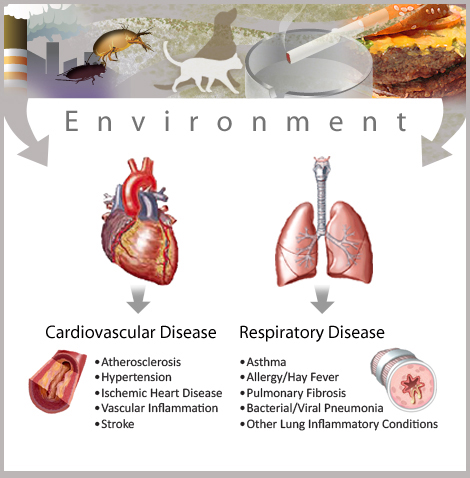Immunity, Inflammation, & Disease Laboratory

Darryl C. Zeldin, M.D.
[email protected]
Research Summary

Darryl C. Zeldin, M.D., is NIEHS Scientific Director, head of the Environmental Cardiopulmonary Disease Group. The group conducts basic and clinical/translational research to better understand the role of the environment in the etiology and pathogenesis of respiratory and cardiovascular diseases such as asthma, allergy/hay fever, pulmonary fibrosis, bacterial/viral pneumonia, other lung inflammatory conditions, atherosclerosis, hypertension, ischemic heart disease, stroke, and vascular inflammation.
The group has a major research interest in eicosanoids, with an emphasis on how they function in the respiratory and cardiovascular systems. The group has identified a family of cytochrome P450 enzymes that are abundant in cardiovascular tissues and active in the metabolism of arachidonic acid to epoxyeicosatrienoic acids (EETs), which have potent anti-inflammatory, vasodilatory and cardiovascular protective effects. They have also studied the role of epoxide hydrolases in the metabolism of EETs to less active dihydroxyeicosatrienoic acids (DHETs). To study the effects of altered expression of cytochromes P450 and epoxide hydrolases on cardiovascular function, the group has developed several new transgenic and knockout mouse models. Opportunities for translational research in this area include development of new drugs for atherosclerosis, hypertension, ischemic heart disease, stroke, and vascular inflammation. Identification of individuals at increased risk for these disorders due to cytochrome P450 and/or epoxide hydrolase genetic variation may also lead to new approaches to disease prevention.
The group has also conducted studies to examine the role of cyclooxygenases in lung function and disease. The work is based on the hypothesis that cyclooxygenase-derived eicosanoids (prostaglandins) are important modulators of the lung immune response to environmental agents, such as allergens and bacterial lipopolysaccharide. The group has developed and characterized several new transgenic and knockout mouse models and is utilizing state-of-the-art techniques such as mass cytometry and single-cell RNA sequencing to elucidate the role of prostaglandins in the allergic lung. This research will lead to additional opportunities for mechanistic and translational research in a variety of inflammatory lung diseases.
Lastly, the group is active in clinical and epidemiological research and investigates how the environment affects allergic and respiratory diseases such as asthma. The group's research focuses on indoor allergen exposures, and other potential risk and modifying factors (e.g., endotoxin, diet, air pollution), which are associated with the development and exacerbation of allergic and respiratory diseases. The group has conducted large national studies which have resulted in a better understanding of the characteristics and predictors of indoor allergen and endotoxin exposures in U.S. households and have provided information on the importance of these exposures in the development and exacerbation of asthma and other allergic diseases that are of significant public health concerns. This work has also provided sound scientific basis for the development and implementation of environmental interventions that are effective in the management and/or prevention of asthma and allergic diseases.
Major area of research:
- Cytochromes P450 and the Bioactivation of Arachidonic Acid
- Cyclooxygenase-derived Eicosanoids
- Asthma, Allergy and the Environment
Current projects:
- Understanding the role of cytochrome P450-derived eicosanoids in cardiovascular homeostasis and in the pathogenesis of cardiovascular diseases such as atherosclerosis, hypertension, ischemic heart disease, stroke, and vascular inflammation
- Elucidating the role of cyclooxygenase-derived eicosanoids in lung function and disease
- Investigating complex relationships between environmental exposures such as indoor allergens and endotoxin, allergic sensitization, and the development and exacerbation of allergic and respiratory diseases, including asthma
Dr. Zeldin earned a B.A. in chemistry from Boston University in 1982 and an M.D. from Indiana University School of Medicine in 1986. He completed a Residency in Internal Medicine at Duke University in 1989 and a Fellowship in Pulmonary/Critical Care Medicine at Vanderbilt University in 1993. He is a physician-scientist who is internationally recognized for his contributions to the fields of environmental health, respiratory disease, and cardiovascular disease. Dr. Zeldin is a Fellow in the American College of Chest Physicians, a Fellow in the American Heart Association and is an elected member of the American Society for Clinical Investigation and American Association of Physicians.
He has served on NIH and foundation study sections and is a member of the editorial boards of multiple scientific journals. He has published over 390 peer-reviewed articles in leading biomedical journals, as well as numerous reviews and book chapters, and his work has been cited over 28,000 times (h-index 91 per Web of Science). Dr. Zeldin is an Adjunct Professor at University of North Carolina at Chapel Hill and North Carolina State University and is a Consulting Professor for Medicine at Duke University Medical Center. He served as the NIEHS Clinical Director from 2007-2011 and is currently the NIEHS Scientific Director. As the NIEHS Scientific Director, he is responsible for one of the largest intramural research programs at the NIH with over 600 scientists in 11 Departments and 18 Core Facilities, and an annual budget of over $140M.


